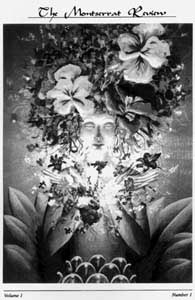Take Their Words
Pressing Matters: Santa Cruz poet and fine printer Gary Young is pleased with the new 'Montserrat Review' and its championing of West Coast writers.
A new literary magazine puts Santa Cruz County writers on the same page with national men and women of letters
By Traci Hukill
IF THE LITERARY community in these parts had to send a representative to a national poetry convention, its members just might pick Gary Young. Laid back, fortysomething, looking good in fat-ribbed cords and a print shirt, Young carries California's Central Coast essence in his easy walk and speech: a casual directness, a willingness to laugh and a blessed lack of conceit.
Young's even more quintessentially Central Californian than usual today, preoccupied as he is with the El Niño-sponsored introduction of a fallen tree to the interior of his home in the Santa Cruz Mountains. For the moment, though, Young is thinking about another project that involves him less directly than home roof repair. Young--printer, teacher and author of three books of poetry--is a contributor to The Montserrat Review, a San Jose-based, nationally oriented literary magazine making its debut this month.
Between bites of ahi sandwich (even the man's lunch is Californian) Young talks about the importance of bringing a West Coast presence to the national literary community. "The East Coast bias against the West Coast is very real," he says. "That's why Robinson Jeffers and Kenneth Rexroth aren't in the canon. People on the East Coast still think of Jeffers as a regionalist.
"There's never been a West Coast magazine of any import," he continues. "[San Francisco's] ZYZZYVA has been publishing for 10 years, which makes it long-lived as a literary magazine, but it publishes mostly West Coast writers, which feeds that regionalist bent a little."
Young knows about literary magazines. For two years in the mid-'70s, he published The Greenhouse Review from his own Santa Cruz press and distributed it nationally, albeit sparsely. "Freedom of the press belongs to the man who owns the press," he says with a grin, paraphrasing journalist A.J. Liebling's wry comment.
In Young's case, having his own press eventually led him to the literary form he's given himself over to, the prose poem. "I had to write the text for a book called Geography of the Home," he recalls, "and I ended up writing one long line throughout the whole book. I started to think of it as a thread on which I'd strung these pearls of prints. Then I got into the idea of writing poetry horizontally rather than vertically. We're taught that figuratively, you fall through a poem, and I wanted something that guides you through the poem."
The prose poem, along with Carmel's Robinson Jeffers and countless other West Coast writers, has received short shrift from certain of the literati who make up the New York writing establishment. It's self-indulgent, some say, too easy to be real poetry. Where's the meter, the enjambment, the caesura? What distinguishes it from prose?
To that tired old criticism, Young responds that giving up the sophisticated techniques of line poetry forces him to hone his language skills to achieve mood and rhythm. "The line [in conventional poetry] tells you when it's poetry, and readers know that they bring something different to 'poetry.' A prose poem is still a poem. If you're going to wrench a poem out of it, it's much more demanding because the language must be so precise. It's easy to make the grand gesture," he shrugs. "It's much harder to make the subtle gesture."
YOUNG, WHO HASN'T SEEN a copy of TMR before today, makes small noises of approval as he scans the review copy in its bulky temporary binder. Although it draws heavily on writers from the greater Bay Area--a little more than half the contributors reside in San Francisco, the South Bay or Santa Cruz--TMR's first issue speaks in decidedly national, even international, tones thanks to its editors. Works by Tom McKeown, Marge Piercy, Michael Spence and writers scattered from New York to New Mexico rub shoulders with translations of Argentinean poet Julio Cortazar and Mauritian Malcolm de Chazal.
The local contingent of poets and fiction writers likewise present a wide range of experience. Morton Marcus teaches writing at Cabrillo College. The exquisitely gifted Jane Pray Silver runs her own multimedia company in Silicon Valley. Poet and physicist Len Anderson lives in San Jose along with TMR associate editor Robert Pesich and a handful of other contributors. Rafael Jesus Gonzalez writes poetry, sculpts and paints in Berkeley.
The first issue is dedicated to world-renowned poet Denise Levertov. Her poem "The Metier of Blossoming," along with another poem to appear in the second issue, arrived in editor Cynthia Lowe's mailbox in early September, just three months before the celebrated poet's death from lymphoma. "She was my favorite," says Lowe. "I was just so excited to have her in the magazine. Then she died just a few months later and we said, 'Let's dedicate it to her.' It just seemed right."
Death haunts the first half of TMR's first issue. Starting with a hearse easing around the corner in Stephen Kessler's "View From the Editor's Desk," the poems--with some exceptions, including an interview with director Buck Henry of The Graduate fame--drift through ghostly houses, suicide scenes and late-night hospital dramas. From there they take a spiritual turn, or at least make extended use of religious imagery, then dip to nature and the sensual stuff of life.
Asked if she organized the magazine this way on purpose, Lowe drops her voice to include a note of wonder. "I sat down and re-read it recently," she says, "and I realized that as an editor there are certain life experiences that cause you to filter through certain materials. I've been touched by death myself in the last couple of years, and I realized I resonate with the fragility of life and loss.
"I was amazed at how much baseball imagery came through!" she laughs.
"To be honest with you," Lowe says, serious again, "it really was almost a dance. The pieces sort of orchestrated themselves, so it just really flowed from one piece to another. I was awestruck that it took on a life of its own."
Knowing They're Hungry
LOWE CALLS POETRY "a religion, a way of conveying the spiritual in what can be a barren landscape, especially in Silicon Valley." If her New Age accent offends some patrician ears, maybe it can be excused: Some poets can't help but wax poetic on the subject of poetry.
For five years Stan Rushworth has edited Porter Gulch Review, a literary magazine published out of Cabrillo College and the only one in Santa Cruz County. Rushworth is the first to acknowledge that the pace of modern life is accelerating and that many people don't feel they have time to read. But he doesn't see that as spelling the doom of literature. Instead, he thinks people need poetry now more than ever.
"How'd that story end up with the kid who had his finger in the dike?" Rushworth asks. "Eventually a lot of people drowned, right? Well, I guess that's my feeling about it. It's very plain to me as a teacher, writer and performer that people are hungry, and that the trends we're seeing--multimedia, TV, film--are leaving people hungry. As Joseph Campbell says, some people know they're hungry and searching, and some don't. When I see my students catching fire with Jimmy Santiago Baca, Neruda, Octavio Paz, and writing poetry in response to it, I realize how important it is. Poetry is an expression of the deepest emotional climate."
Young praises TMR for its breadth and its power to unite readers and writers. "There are literary communities international in scope," he says, pushing the review copy back across the table, "and people recognize each other from being published in the same journals. They get to see that their work is complementary. What makes literary journals so wonderful is they're clearinghouses where other people--readers--can participate in the dialogue."
As The Montserrat Review, which takes its title from a monastery outside Barcelona, rounds the last turn of production and gears up for a first run of 1,500 copies, Lowe finds herself awash in anticipation. "I liken it to being a midwife," she muses, "and this is a child I've helped give birth to. I want to count its fingers and toes and be sure it has a healthy glow."
It appears that she has little to worry about. Given the dearth of local literary magazines and the hunger for what she's offering, Cynthia Lowe's glowing brainchild looks like one of the brightest lights on the West Coast.
Porter Gulch Review is accepting submissions for prose and poetry (deadline: March 10) and artwork (deadline: April 1). Send submissions to: Porter Gulch Review, Cabrillo College, 6500 Soquel Dr., Aptos. For info on specs, call the English Department at 479-6424.
Copyright © Metro Publishing Inc. Maintained by Boulevards New Media.
![]()

Robert Scheer Death and the Poet
Death and the Poet
The Montserrat Review celebrates its debut with a reading featuring Santa Cruz poets Gary Young, Morton Marcus and Eran Williams on Friday (8pm) at the Capitola Theater, 120 Monterey Ave., Capitola. Admission is free. For more info, call 295-2805.
From the February 26-March 4, 1998 issue of Metro Santa Cruz.
![[MetroActive Books]](/books/gifs/books468.gif)